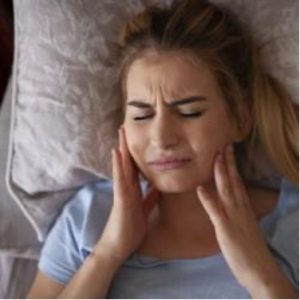 Bruxism (teeth grinding) can ruin your smile and wreak havoc on oral health. Bruxism causes uneven wear on your teeth, gum problems, and even tooth breakage. Also, bruxism can be the culprit behind a condition that affects nearly 18 million Americans, sleep apnea.
Bruxism (teeth grinding) can ruin your smile and wreak havoc on oral health. Bruxism causes uneven wear on your teeth, gum problems, and even tooth breakage. Also, bruxism can be the culprit behind a condition that affects nearly 18 million Americans, sleep apnea.
If it’s been a while since you’ve enjoyed a restful night’s sleep, a trip to the dentist might give you the answers you need.
What is Sleep Apnea?
Sleep apnea is a condition that interrupts your breathing while you sleep. These interruptions in your breathing can last anywhere from seconds to a few minutes, and they can occur dozens of times per hour. These interruptions ruin your sleep, making you exhausted in the morning.
What Is Causing My Teeth to Grind?
While the direct cause of bruxism is unknown, it’s widely believed to be a bodily response to stress or anxiety.
Several factors could increase your risk for teeth grinding, including:
- Age
- Medications
- Family history
- And other health conditions.
When your teeth grind while you sleep, it’s often painful the next day. Your jaw, neck, and face can hurt, and you can also have a dull headache from clenching your teeth.
How are Bruxism and Sleep Apnea Connected?
Many theories hypothesize about the potential link between sleep apnea and bruxism. A common hypothesis is airway obstruction causes stress in your body, making you tighten your jaw muscles while you sleep, leading to clenching or grinding of your teeth.
Another belief is that snoring from sleep apnea creates instability in your airway, making your brain tighten your jaw muscles.
Experts speculate how bruxism and sleep apnea are connected, but a definitive connection is unclear.
How is Bruxism Treated?
During an exam, we will look for indications of bruxism such as, worn-down tooth enamel, damaged teeth, or gum recession.
After an exam, we can help you determine the best way to treat your bruxism. Typically mild cases are treated with splints, mouth guards, or crowns.
Your treatment depends on your unique needs, and we are happy to discuss options that work best for you.
Can My Sleep Apnea Be Cured?
While sleep apnea does not have an official cure, getting bruxism under control can help. Sometimes, a custom oral guard can be what you need to prevent jaw clenching and subsequently control breathing interruptions.
Also, stress management can play a role in treating sleep apnea and bruxism. Managing your stress during the day may help your body respond better while you sleep, reducing jaw clenching and teeth-grinding, and help your sleep quality.
If you believe that bruxism plays a role in your sleep apnea, Warr Dental can help you with your concerns. Schedule your free initial screening by calling our Salt Lake City office at 801-355-5385.




